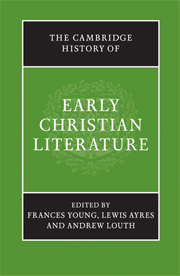Book contents
- Frontmatter
- PART ONE The Beginnings: The New Testament to Irenaeus
- A LITERARY GUIDE
- 1 Introduction: the literary culture of the earliest christianity
- 2 The apostolic and sub-apostolic writings: the New Testament and the Apostolic Fathers
- 3 Gnostic literature
- 4 Apocryphal writings and Acts of the martyrs
- 5 The Apologists
- 6 Irenaeus of Lyon
- B CONTEXT AND INTERPRETATION
- PART TWO THE THIRD CENTURY
- PART THREE FOUNDATION OF A NEW CULTURE: FROM DIOCLETIAN TO CYRIL
- Bibliographies
- Index
- Map: The Roman Empire in the late fourth century AD"
- References
6 - Irenaeus of Lyon
from A - LITERARY GUIDE
Published online by Cambridge University Press: 28 March 2008
- Frontmatter
- PART ONE The Beginnings: The New Testament to Irenaeus
- A LITERARY GUIDE
- 1 Introduction: the literary culture of the earliest christianity
- 2 The apostolic and sub-apostolic writings: the New Testament and the Apostolic Fathers
- 3 Gnostic literature
- 4 Apocryphal writings and Acts of the martyrs
- 5 The Apologists
- 6 Irenaeus of Lyon
- B CONTEXT AND INTERPRETATION
- PART TWO THE THIRD CENTURY
- PART THREE FOUNDATION OF A NEW CULTURE: FROM DIOCLETIAN TO CYRIL
- Bibliographies
- Index
- Map: The Roman Empire in the late fourth century AD"
- References
Summary
Irenaeus, head of the Christian community at Lyon (Lugdunum) in Gaul after c. 177, was a central figure in the second-century debate stimulated in the Christian churches by gnosticism and by the teachings of Marcion. His principal writing on these subjects – the treatise now known as Against Heresies–was significant not only for its criticisms and denunciations of his opponents, but also for its contribution to (a) the churches’ development of authoritative norms of teaching and (b) their ‘theology’, i.e., their interpretation of these norms for catechetical purposes.
Irenaeus was not a native of Gaul or a citizen of Lugdunum (a Roman colony founded in 43 bc, shortly after Caesar’s victories in Gaul). Like most Christians there, he was an immigrant. He himself tells us (AH 3.3.4; cf. Eusebius, HE 5.20.5ff.) that in his ‘youth’ he saw Polycarp, the bishop of Smyrna who was martyred c. 156. The likelihood is, therefore, that Irenaeus was born in Smyrna during the thirties or perhaps the forties of the second century. As to when and how he came to Lyon – which was the principal centre for trade, transport and government in central and northern Gaul – it is impossible to say with any certainty, though it seems probable that he sojourned for a time in Rome on his way. Somewhere, and almost certainly in Smyrna, he acquired a basic rhetorical education which in the end he put to good use. If the doxographic information he deploys in Against Heresies 2.14 is a proper clue to the extent of his acquaintance with the philosophical tradition, he did not graduate to any serious study of that subject; but he seems to have been a systematic reader of earlier Christian writers (not excluding some of his opponents), and through them he seems to have absorbed and mastered concepts that were current in his day in cultured discussions of God, the human constitution, and the like.
- Type
- Chapter
- Information
- The Cambridge History of Early Christian Literature , pp. 45 - 52Publisher: Cambridge University PressPrint publication year: 2004

